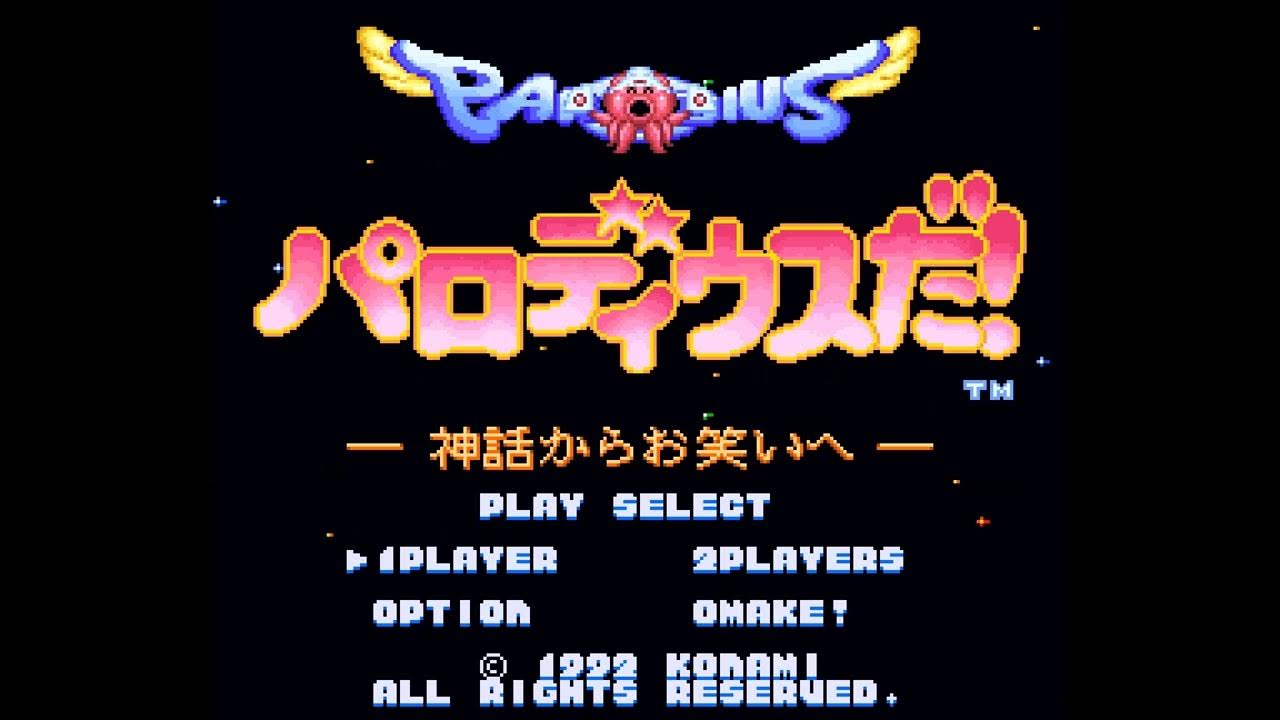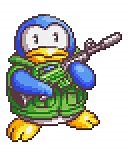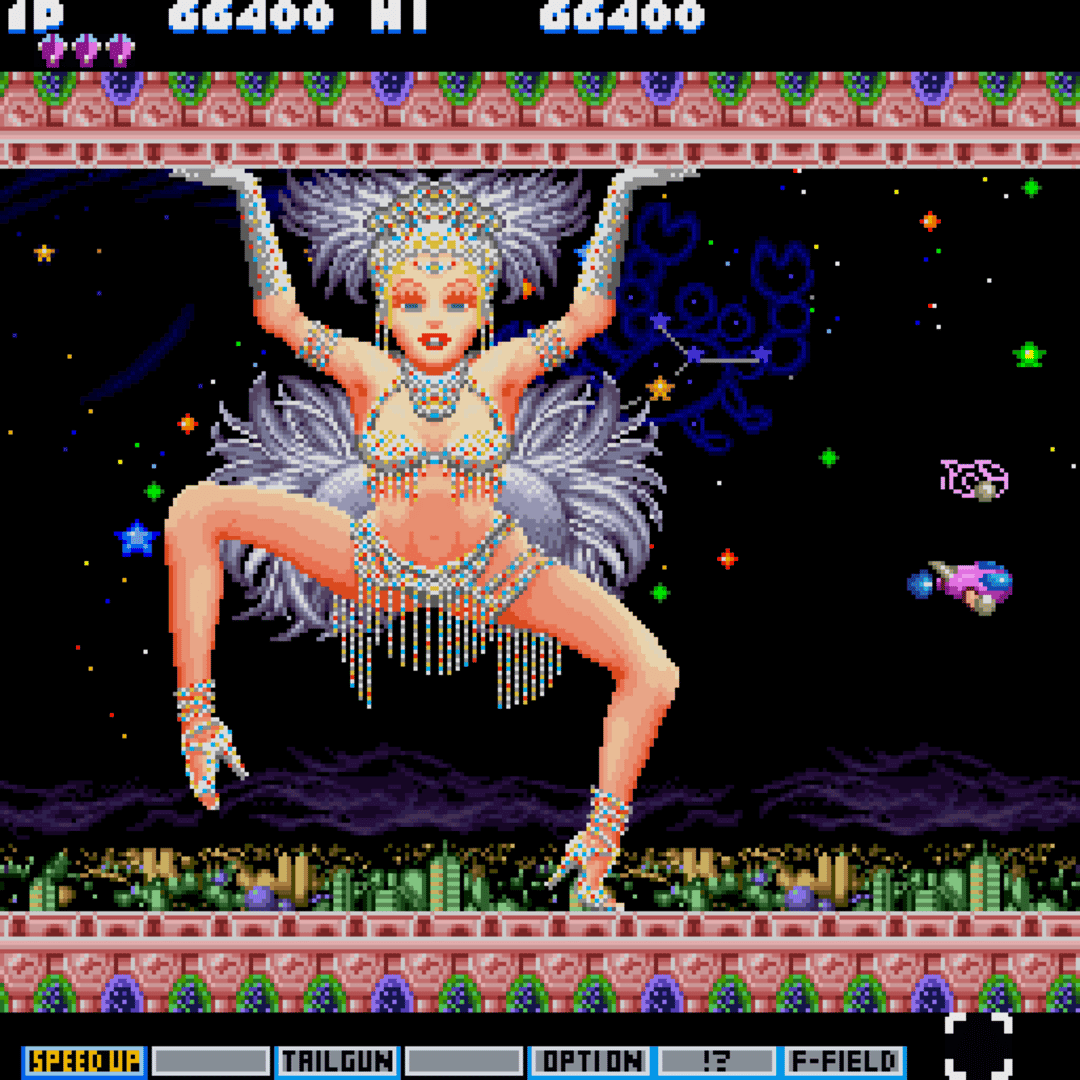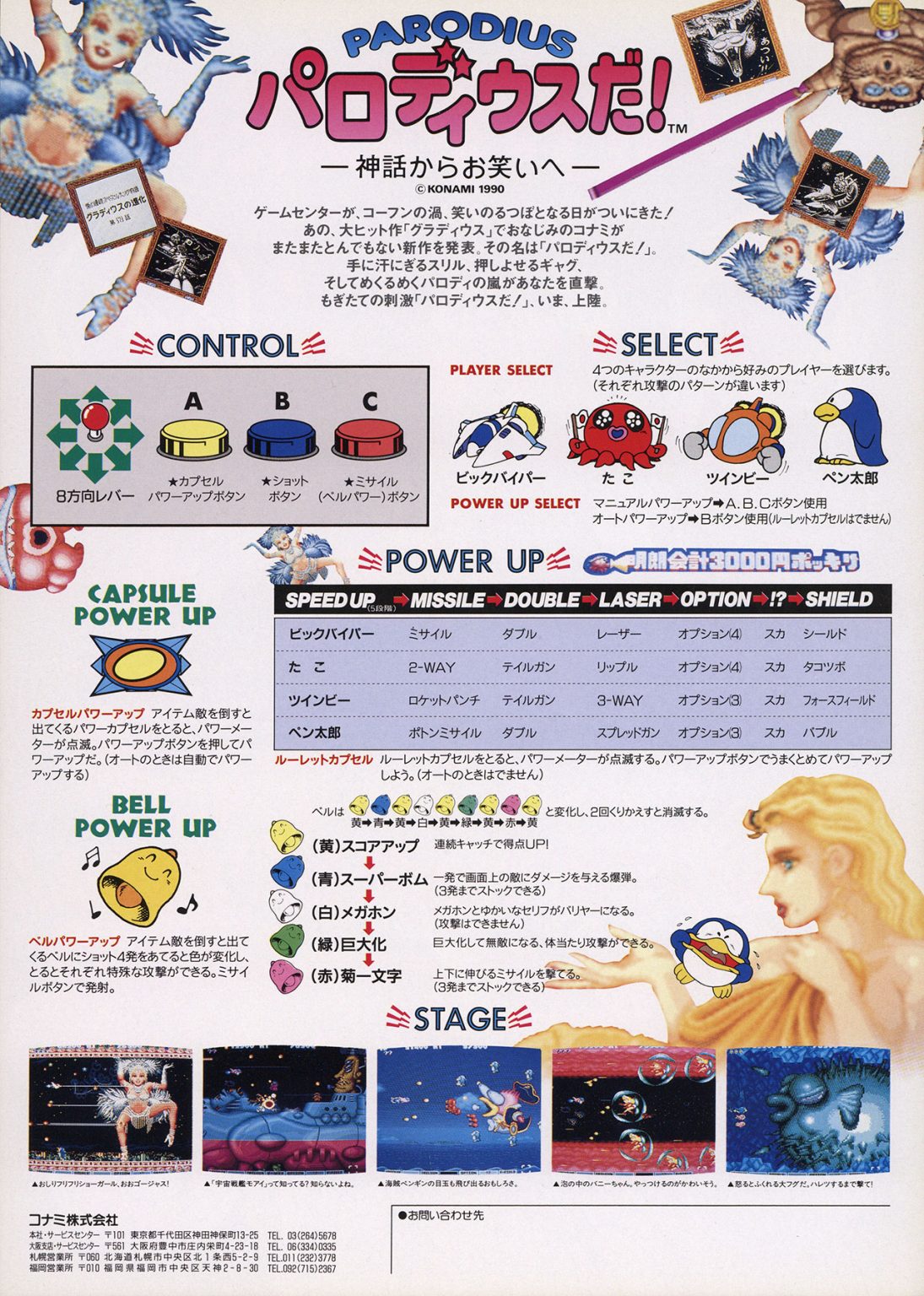Title: Parodius Da! Shinwa kara Owarai he (trans. "It's Parodius! From Myth to Comedy")
Release Date: 7/03/92
Developer/Publisher: Konami
The shmup genre, as compared to other video game genres, has always felt like a creatively constrained genre. Each shmup is a take on the same gameplay loop: autoscrolling levels, eye catching backgrounds, power-up systems that reward perfect play, devilish bullet patterns that require precision reflexes or rote memorization, and big, impressive boss fights to cap off each stage. Generally, each game is the developers take on these core systems.
The more critically impressive schmups, historically, have been the ones that play with the gameplay aspects of the genre: Ikaruga with its black and white phase state mechanics, or Cave's pushing the bullet patterns to the limits of human response times. Most developers, though, choose to differentiate their games through the art and aesthetic, which is where the "cute-em-up" genre has its roots.
Shmups, more often than not, are rooted to the science fiction genre: what's more fun than flying a supersonic jetplane, than flying that jetplane into an alien dreadnought. Konami's Gradius series is high science fiction: Vic Viper and his little plane that could taking down legions of bio-mechanical and techno-organic monstrosities in order to save the world. It is grim, it is isolating at times, and the designs of some of the bosses can be quite freaky (I always think of the giant plant boss in Gradius III). Perhaps the Parodius series was a response to this style of "serious" science fiction; perhaps, for some, that grim-dark science fiction was off-putting? Why not, instead, catch some more flies with honey? Konami already started the cute-em-up genre with Twin Bee, so Parodius feels like a logical extension; why not take the workings of one of our more hardcore shmups and dress it up as a cute-em-up?
Parodius is adorable; it is a cute-em-up through and through. the color palette to the game is mainly bright vibrant primary colors, the music is cutesy versions of public domain classical music, and even the bosses seem more "stunned" than killed by your weapons fire. It is alluring, it is attractive to look at, and in an arcade next to what I picture as late 80's and early 90's arcade games, must really have stood out. While this game is adorable, though, under the hood it is basically Gradius III, just with a thick candy shell around it. This is both welcome; that system is a well-crafted and fun upgrade system that rewards perfect play and memorization of patterns (in a nice balance), but also quite off-putting as the "poor gets poorer" difficulty from the Gradius games and high level of difficulty is also present.
While this game started in the arcades, this game was ported to most every contemporaneous console or handheld at the time, though only in Japan. Certain versions, including this Super Famicom version, have unique content such as bosses or portions of stages.
This game is the first in the series, as well, which would go on to have several sequels, and even a "sexy" version (named Sexy Parodius of course) for the older horny teens in the arcades. We will even get to play some more of these games for the blog.
Characters and Power-ups
The game allows you to choose from four different characters and/or ships: Vic Viper from the main Gradius series, who plays and upgrades exactly the same as he did in Gradius III. He has the most forward facing offense and therefore the highest DPS of any of the characters. This means he can melt through bosses, but struggles when enemies are above him especially.
Octopus, who is actually considered the protagonist of the Parodius series, is a good choice who focuses on options and has a wide spreadshot of rings. I enjoyed playing as him, but he really struggled on a particular stage where you have to navigate a maze while destroying colorful balls.
Twin Bee the animate plane from Twin Bee, who I did not play as, but I saw that he throws his hands like in his own series...
...and finally Pentarou the Penguin, who would go on to have a little cult following of his own! I actually beat the game as Pentarou. He is useful as he has a "bubble" invulnerability item, and his attacks do a great job of covering the floor and the ceiling.
Each one functions as a different load-out to play as, and generally will fit personal preference for the "spread" of your bullets. Vic focuses on strong frontal attacks, while the other three are variations of choosing spread over concentrating shots.
Each, as well, upgrades using the Gradius style of upgrades: defeating a chain of enemies will reward you with a power-up that will push you up the upgrade chain. The more power-ups you collect, the more you can bank for powerful upgrades. Like Gradius, there are some traps: you can upgrade your speed (the least costly of the power ups), and this is necessary to an extent; you can also upgrade your speed, though, to the point where a slight movement will inevitably throw you into a wall, killing you instantly. As well, there is a ?! upgrade which is right next to the final upgrade, which will instead nuke all of your upgrades and put you back to square one. Like Gradius, this creates a balancing act of controlling and monitoring the action on screen while also actively your upgrade path.
In addition, the game adds the bells from the Twinbee series, which can be shot to either gain more points or to change color to grant temporary power ups, i.e. a screen clear, or an megaphone which eats bullets and enemies while granting temporary invulnerability. This helps even out the difficulty curve of the game somewhat.
Difficulty
Like Gradius, Parodius pulls no punches. Any upgrades are lost any time you die, and in any of the later stages this mean pretty much a game over. Your base speed is incredibly ponderous, and in the later levels you have to upgrade, or you won't survive the first curve in a maze segment.
As well, this game uses checkpoints rather than immediate restarting upon death. Overall, this means that the game really is about sustained perfection and memorization of hazards. This wouldn't be too bad if the game was just about memorizing enemy and bullet patterns, but there are also mazes that you must navigate with obstacles you must destroy, and even touching even a single pixel of wall or obstacle in these mazes results in immediate death. Here are some sections that are particularly atrocious...
- Stage 3: There is one ball-pit maze that is incredibly egregious especially, as you have narrow corridors, small multi-colored balls you must destroy, and plenty of enemies lobbing projectiles your way. You can choose wrong paths in the maze and not know it until it costs you a life.
- Stage 4: This is a fun level in a "whacky" Japan, where a cherry tree marches back and forth across the screen. The tree takes up half the screen, and there is another tree hanging from the ceiling. You only have a precise and limited window to fly through the area before the walking cherry tree blocks you in and crushes you across the scrolling scren.
- The Yokai boss is a "speed check." This ghost woman begins by chasing you relentlessly around the screen to make sure you have above base speed. If you aren't decently leveled up then you will immediately be caught by the ghost and its a game over.
- The final boss, in order to challenge him, is hidden behind a door that will start shutting. You have a very limited window to shoot through a bunch of dross and octopi guarding his final chamber before you are locked out of the final boss room and it costs you a life.
Like the base game of Gradius the game isn't just about shooting, but navigating the stages themselves. The stages in this game utilize a floor and a ceiling, and part of the game is managing creatures that appear on both the floor and the ceiling. If you let too much in one area build up, or don't deal with the projectiles or path that is appearing right in front of you, it is really easy to be overwhelmed or pinged by a stray bullet.
Finally, this game is also LONG, with ten stages, each with multiple segments and usually with at least two bosses. On my first attempt, I was able to make it to stage three, the dreaded candy castle with the ballpit maze. It took me three more attempts to clear the ball pit, where I was immediately squashed by the volcano stage 4, and finally on my best attempt was destroyed by the Maoi head boss of stage 5. This is only half the game (technically just shy of half) after multiple hours of attempts. Death at stage four or five meant either a game over and restart, or a very lucky scramble to quickly upgrade my speed and get back to fighting weight. At that point, it was save state time, which allowed me to finish the game and beat the final boss.
Graphics and Music
I'm glad I decided to save-state it, as the rest of the game is quite delightful and a feast for the eyes. Shmups, by nature, leverage your curiosity to "see what's next" after "one more quarter," and Parodius has that going on in spades. Each boss is a fun delight or spin on another Gradius boss or type of boss. Weird crab robot where you have to duck between its legs; how about we replace that with a Vegas show girl? The sprites are large, filled with personality, well designed, and appropriately detailed for novelty.
The stages themselves each follow a certain aesthetic theme. There is a yokai/Shinto underworld stage, a stylized Japanese countryside, an amorous bathhouse filled with women in bubbles, and the inside of a pinball machine. The last level is a fun one too, with an assault on the evil octopus, Emperor Zeo, in his dreadnaught, where you are taking on his elite Penguin Shower contraption (it's a thing) and finally take on the giant octopus himself.
The bosses are fun too: you have an Uncle Sam cosplaying Bald Eagle, a fat pig sumo wrestler, a Maoi statue in drag, and a pirate ship whose masthead is a cute pirate kitten.
The humor of the game is also very absurdist and "lol random;" it's a parody, nothing has to make logical sense. This might have better mileage for some; you definitely need to enjoy the novelty of random schtick.
The music, as well, is carnival takes on classical and public domain music. It...can be cloying and annoying, but these pieces of music are classics for a reason; even with the strange sound font, they are ear worms.
Overall
The first Parodius game is a fun shmup, and I am glad I played it, but the reliance on the difficulty and quarter muncher nature of the original Gradius really doesn't balance well with the cutesy aesthetic. If you are trying to lure in an audience who is not familiar with shmups, often considered one of the more hardcore classic game genres, and you choose an aesthetic that screams "accessible," why make it so difficult? If you are making a game to lure a younger audience, then they should be able to make it past the first stage. Even if the child is watching over their older sibling's shoulder, this game is too hard without some serious practice.
I'm just not sure who this series was for; is the joke implied by this games title on us as the player? Is it my fault that I assumed "cute" meant easy? I am not sure, but it feels like the game is laughing at me rather than with me. Perhaps this reliance on being tied to Gradius is part of the problem; I mean it is marketed as a direct parody and riff on that series, so maybe they felt people will expect higher difficulty. Would this game have been better divorced from that progenitor series, or worse for it?
Perhaps this liminal space between hardcore shmup and cutesy game is why this game was never localized for North America or Europe. I feel like other cute-em-ups are able to straddle this line much more effectively: Harmful Park, Gunbird, and the Cotton series all lean into this adorable aesthetic but don't show their teeth until after a couple of missions at least. In the end, this leaves me curious to see how this weird little sub-series will progress as we play through more of its games.





















No comments:
Post a Comment